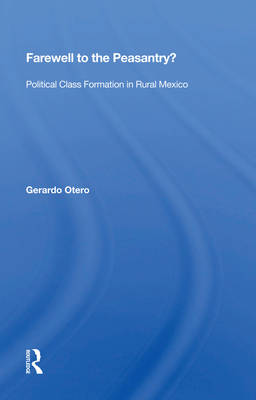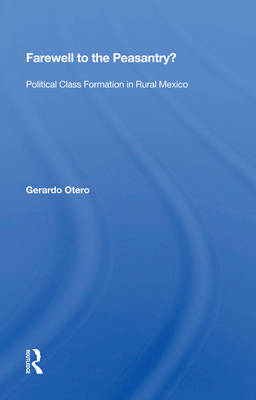
- Retrait gratuit dans votre magasin Club
- 7.000.000 titres dans notre catalogue
- Payer en toute sécurité
- Toujours un magasin près de chez vous
- Retrait gratuit dans votre magasin Club
- 7.000.0000 titres dans notre catalogue
- Payer en toute sécurité
- Toujours un magasin près de chez vous
Farewell to the Peasantry?
Political Class Formation in Rural Mexico
Gerardo Otero
Livre relié | Anglais
195,95 €
+ 391 points
Format
Description
Farewell to the Peasantry? questions class-reductionist assumptions in certain Marxist and populist approaches to political movements in twentieth-century rural Mexico. Focusing on agrarian social structures, political movements, and state intervention, it studies the political class trajectories of direct producers in three agricultural regions from the 1930s to the present. This study offers an analysis of varying intersections of class relations, political mobilization, and distinctive regional cultural traditions. Following a broader trend, this analysis seeks to transcend unidirectional and single-factor approaches to peasant mobilization and social transformation. The book offers an explanation of diverse political class destinations of agricultural workers in three regions from the 1930s to the present in terms of regional cultures, state intervention, and leadership types. Political class formation is seen as the process by which civil society is constructed and as a vital part in the transition toward a societal democracy. This book also addresses Mexico's legendary agrarian reform in historical perspective. The author argues that land redistribution in Mexico was the way chosen to develop and entrench capitalism in Mexico while building a basis of support for the modern Mexican state. He provides an account of the global agrarian transitions and the social differentiation process in the Mexican countryside as well as the changes brought about in agrarian policies by the neoliberal reform that has swept Mexico since the mid-1980s. Neoliberal-ism has increased the insecurity of wage employment in most sectors of the economy, thus bringing about an ironic result in the agrarian social structure: On the one hand, it has created the conditions for an entrepreneurial peasantry to emerge, but on the other, while the middle peasantry shrinks, large masses of the rural population are becoming unemployed or resorting to subsistence production as a survival st
Spécifications
Parties prenantes
- Auteur(s) :
- Editeur:
Contenu
- Nombre de pages :
- 200
- Langue:
- Anglais
Caractéristiques
- EAN:
- 9780367007218
- Date de parution :
- 07-06-19
- Format:
- Livre relié
- Format numérique:
- Genaaid
- Dimensions :
- 146 mm x 229 mm
- Poids :
- 530 g

Les avis
Nous publions uniquement les avis qui respectent les conditions requises. Consultez nos conditions pour les avis.






